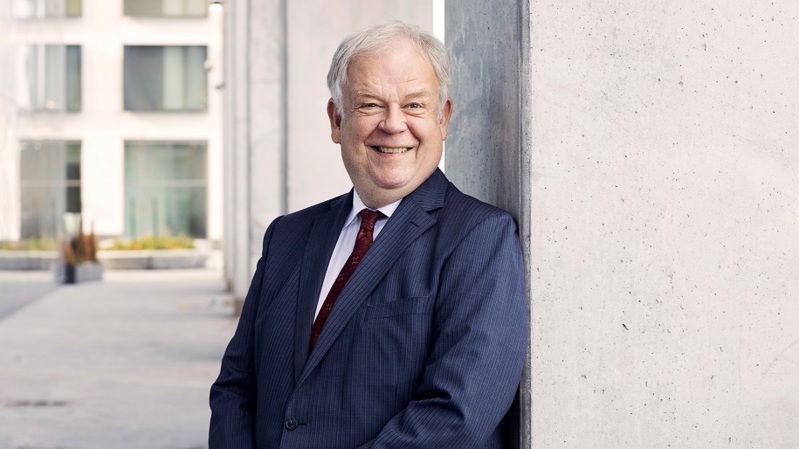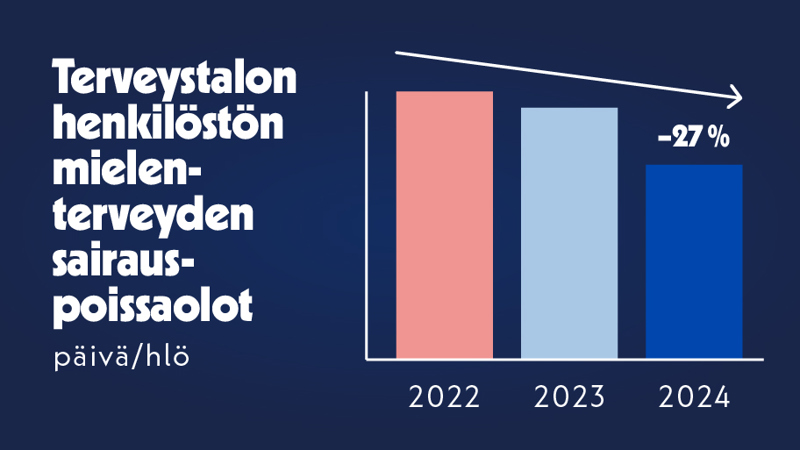Supervisors play a key role in identifying substance abuse problems
Alcohol is a legal intoxicant used by the majority of Finns. In principle, the employer does not have the right to interfere in the leisure activities of its staff, but in situations where the use of intoxicants during free time affects work, intervening is justified. It is the supervisors’ responsibility to not hesitate to ask questions if they are concerned about an employee's behavior. According to Sanna Eronen, Chief Occupational Health Psychologist at Terveystalo, it is respectful and caring to be open and direct about an issue, but intervening in another person’s behavior is something that most people prefer to avoid. Even though speaking up is difficult, postponing the discussion poses a much greater risk.

Substance abuse problems may manifest themselves through various signs. The signs may be quite vague and make the supervisor wonder if they should be concerned about the employee. There may be changes in the employee’s general alertness and conduct, making it hard for them to be as efficient at work as before. They may also have had more sickness absences than usual. In order to prevent possible substance abuse from becoming a major problem, supervisors must know how to raise the issue at an early stage.
In addition to subtle signs, the supervisor may notice signs of substance abuse during the employee’s free time or at work-related events. For example, the employee may often call in sick after a night out or a company Christmas party. The most obvious signs of substance abuse at the workplace include smelling of alcohol or constantly appearing hung over or even intoxicated.
“In order to be able to bring up difficult issues, the work community must have established an atmosphere that supports difficult discussions. Supervisors should ensure a positive relationship that encourages dialogue with the employees before problems arise. One clear way, for example, is to regularly review your company's substance abuse prevention model with your work community. This way, everyone will have the courage to speak to the supervisor if they have concerns about a colleague,” says Eronen.
How do I express my concern?
Eronen emphasizes that the most important thing in speaking up is preparation.
“Make sure you thoroughly understand what you're worried about so you know how to put it into words. The employee needs to understand what the feedback is about. Seek reassurance by discussing the matter in advance with the HR Director and your supervisor.”
In the discussion, the employee must be given the opportunity to explain the situation in their own words. Sometimes, new information may arise, making it important to correct your initial assumptions.
“Instead of a debate, the discussion should take the form of interaction where the manager is expected to be able to actively listen. If the employee disputes everything, ask them to give their views on the situation in their own words and focus on agreeing on the next steps.”
Active listening* is:
- Receptive. The listener considers the message important and meaningful.
- Focused. The listener thoroughly focuses on the issue.
- Respectful. We hear the speaker as they are.
- Patient. The listener trusts that the speaker will open up when they are ready.
Simply expressing your concern can often ignite the internal motivation to make things right. Even if the employee denies everything during the discussion, it may act as an incentive to make changes in their life.
“Expressing concern means caring about the employee's well-being. Referral for treatment or setting other boundaries always gives the employee a chance to make changes,” says Eronen.
More support for supervisors to address substance abuse problems
Terveystalo has revised its treatment model for substance abuse problems, which is now supported also by coaching for supervisors. The coaching helps supervisors address substance abuse problems at the workplace. The coaching offers supervisors information and tools to identify substance abuse problems, speak up and take action at an early stage. The coaching is suited for supervisors of workplaces of all sizes and can be completed completely remotely when it best suits your schedule.
Online coaching for companies
Terveystalo’s online coaching supports the management, work community management, work ability and well-being of your company. The coaching provides valuable information and practical tools effortlessly and at a low threshold directly from top experts in the field. All of our coaching is available completely remotely, making it possible to offer consistent coaching to your entire organization's staff. Coaching is available for supervisors, HR decision-makers and employees of organizations of all sizes. We use information to turn healthy employees into healthy work communities, and healthy work communities into successful companies.
Online coaching for supervisors
Participate in our ‘Substance abuse at the workplace’ online coaching or ask for a quote for your staff. Information and practical tools for supervisors to identify substance abuse problems, speak up and take action at an early stage. Suitable for supervisors of organizations of all sizes.
Read more articles

Occupational health psychologists are underutilized amidst the tsunami of mental health issues
The increase in psychological problems and burnout at work is constantly being discussed. Mental health disorders are one of the major causes of decreased work efficiency, absenteeism, and transition to disability pensions. One might ask why this situation persists, despite the fact that our country has a unique and highly regarded occupational health care system, with a large number of experts in the connection between work and mental health – us occupational health psychologists.

Collaboration is the only way to solve wicked problems
Disability due to mental health challenges is a complex and nebulous problem that cannot be solved by individual tricks. It requires a long-term and systematic approach at both individual and community level. According to Simo Taimela, senior epidemiologist at Terveystalo, tackling the mental health epidemic requires both preventive measures for work communities and targeted and effective treatment for those who will benefit most.

Mental health-related sickness absences finally started to decrease - Terveystalo commits to an ambitious target for 2025
In Finland, it is estimated that up to 7 million working days are lost each year due to mental health-related sick leave. Not only can mental health challenges, if chronic, lead to unnecessary premature exclusion from working life, but the situation is also unsustainable for Finland's vitality and national economy. Recent data from Terveystalo show that timely and appropriate interventions have reduced the duration of mental health-related absenteeism and brought it down for the first time in a decade. This significant turnaround gives hope that the mental health crisis can be prevented, but it will require a concerted effort by all concerned.

Terveystalo increases transparency in the mental health debate and will in future publish information on the company's own mental health-related sickness absences
By publishing Terveystalo's own mental health absence statistics, Terveystalo wants to increase transparency in the mental health debate and encourage organisations to share their own successes in tackling the mental health crisis.

How to prevent overheating in working life - A recent survey shows that 80% of Finns feel the pace of working life has accelerated
According to a survey* commissioned by Terveystalo, up to four out of five Finns feel that the pace of working life has become faster and more stressful. Only 13% of respondents feel that working life is developing in a positive direction. This acceleration of the pace of work is reflected in a growing number of mental health problems among working-age people, which affects their ability to work and the productivity and growth prospects of companies. Terveystalo's organisational psychologists Jaakko Sahimaa and Annamari Heikkilä call for a sustainable pace of work as a solution to the overheating of working life.

Where there is love for medicine, there is love for humanity
Hippocrates' wise words help us make the right choices. Our commitment to our mission, working for a healthier life, extends beyond the provision of quality health services to the promotion of human rights throughout our value chain.